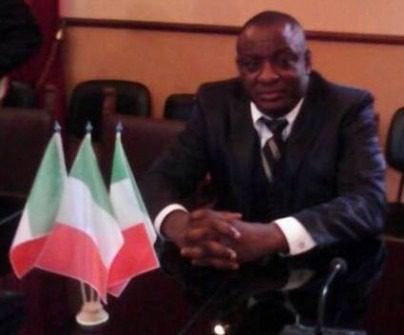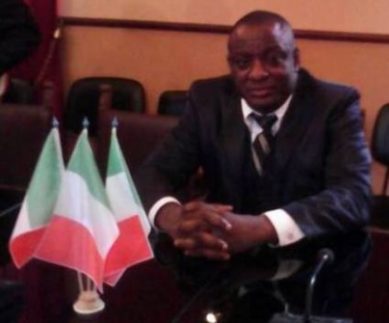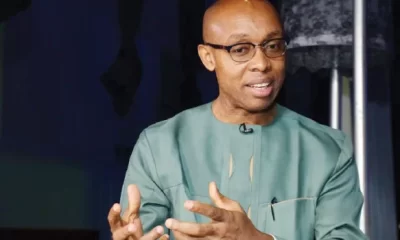Political Issues
Tinubu: The Day I Saw Tomorrow -By Iyoha John Darlington

The legendary Nostradamus probably reincarnated in me during the historic run-up to the 2015 general elections in my article titled “Asiwaju Nourishing Vipers In His Bosom”, which was published by both local and foreign media about eight months ago. In a swift response and reaction, Mr. Joe Igbokwe, the Lagos State APC publicity secretary got it all twisted and severely criticised the piece, accusing me of wanting to fell the evergreen holm oak – the Asiwaju of the Yoruba race. Upon my soul, my intentions were not only misjudged, misrepresented but ultimately misconstrued.
There is no denying Tinubu’s place in history for he has doubtless become an iconic figure in Nigerian politics. He is an astute politician and political strategist who has been at the forefront of Nigeria’s pro-democracy struggle. Tinubu began his political career following his election as a senator in the short-lived Nigerian Third Republic. His daring exploits began in 1993 when the election that would have brought the late MKO Abiola to power was annulled by the self-styled evil genius, ex-military president Ibrahim Babangida. Nigerians on June 12 went out and voted en masse for the above-named uncrowned winner. That was the election in Nigeria that for the first time succeeded in cutting across ethnic and religious divides but IBB, as he is fondly called, had it annulled, and the sovereign wish of the Nigerian electorate was ultimately bastardised.
During that period, it became clear that the military was not ready to relinquish its hold on power in Nigeria and Tinubu, along with other Nigerians, embarked on a pro-democracy struggle under the auspices of National Democratic Coalition (NADECO), with many people getting killed during Abacha’s reign of terror. It was all in a bid to revalidate the result of June 12 and restore the stolen mandate. This saw his flight from Nigeria on self-exile, from where he continued the struggle to return Nigeria to civil democratic rule. As circumstances would have it, his efforts did not see the light of the day. Abiola died while in detention. The curtain at this juncture was torn in two and the Nigerian political firmament emanated gloom, anxiety and uncertainty, which led to a series of demonstrations across the country. Nigeria eventually returned to civil democratic rule in 1999, with Tinubu elected as the Lagos State governor under the platform of Alliance for Democracy (AD).
Those were, indeed, interesting times. Tinubu delved into work immediately and in no time the plot against Lagos was foiled by his policies to restore the state’s lost glory. This he achieved by dint of hard work to reposition the state on the path of socio-politico and economic development. This found expression in infrastructural renewal and development that ultimately made Lagos a reference point in governance in Nigeria till date. Continuity has always been the watchword of his handpicked successors.
Lagos, Nigeria’s number one city and economic hub became the cynosure of all eyes in Nigeria and beyond. Many Nigerians thus wanted the developmental strides in Lagos replicated in their states. In the elections that followed, Tinubu’s party rose to capture states in the South-West under the Peoples’ Democratic Party (PDP) control, notably Oyo, Ogun, Osun, Ekiti and later Edo State. Tinubu had, by this time, become a formidable political force to reckon with and this brought him national prominence.
Having successfully established himself as a power broker and icon of Nigerian politics, especially in the South-West, the most developed region in Nigeria, Tinubu as a king maker became a force to be wooed if one were to go far in the bid to get Nigeria’s plum job. Former President Jonathan had no option but to seek his support in the hotly contested election of 2011. Tinubu’s political machine in the South-West roared into motion, on which former President Jonathan sat and rode to power with the country’s North, especially the core Hausa-Fulani States throwing their weight behind the candidate of the defunct Congress For Progressive Change (CPC), General Muhammadu Buhari (Rtd.)
Former President Jonathan, grapevine sources say, brokered one tenure agreement with the Northern political gladiators who visibly frowned at his subsequent interest and desire for a second term. Thus every antic was employed to frustrate him in order to get back their ‘slot’ and return power to the North. Tinubu and the South-West became a Hobson’s choice and the wooing of the Great Oak began, as they sought solace under its branches.
On Bourdilon Road Ikoyi, residence of the Asiwaju, a series of meetings ensued which were to change the political climate of Nigeria. Another agreement was brokered with the South-West forming a political alliance with Hausa-Fulani oligarchy. This brought about a merger that gave birth to the All Progressives Congress (APC). With Tinubu at the forefront, the presidential primaries took place in Lagos, Nigeria and through the agency of Bola Ahmed Tinubu, Muhammadu Buhari clinched the ticket to contest the presidency again, which he had previously lost three consecutive times.
With Tinubu delivering the whole of South-West votes to APC, save Ekiti State, Buhari ‘won’ the 2015 presidential election and former President Jonathan’s early concession of defeat saved a nation and people who were dangerously on the brink from the agony of bloodshed.
Today Buhari is Nigeria’s ‘elected’ President; the man who sits on the throne presiding over the affairs of over 170 million Nigerians. His success story will not be complete without mentioning the pivotal role played by the Great Oak – the Asiwaju of the Yoruba race, Bola Ahmed Tinubu. This dogged fighter on whose back the North and Buhari rode back to power deserves a pat on the back, all things considered.
Today, I often read the diatribes in popular Nigerian dailies downplaying the efforts of a man who sacrificed and contributed so much to Nigeria’s democracy, and more so on whose back the North rode back to power in Nigeria. I often sit back with mouth agape in bewilderment on hearing the strings of invectives and false commentary heaped on a man who bankrolled the APC to the seat of power in Abuja. The question that agitates one’s mind is: does Tinubu deserve the treatment being meted out to him by northern political gladiators?
When caught trying to reap where you did not sow, you are labeled a thief and charged with theft. Many who criticise him today stayed aloof while the battle raged to kick the military out of power in Nigeria. President Buhari, the major beneficiary today of Tinubu’s prodemocracy struggle had himself tucked away in the desert city of Daura, Katsina State. But today he bestrides the Nigerian political world like a colossus in his capacity as the ‘elected’ President of Nigeria while the major power broker is surprisingly being kept tabs on, to cut him down to size. This could be likened to none other than the foolish counsel of Ahithophel in one of the Bible stories, by his kith and kin of Northern extraction, which the President has taken hook, line and, sinker. This ought not to be after all!
Events playing out in the NASS election and the President’s reaction calls for concern. Buhari, we read, in the dailies has insisted on the party supremacy. We have read, times without number, when his apologists of Northern extraction have advised that Tinubu and Amaechi be paid off to make it a strictly Northern presidency. Upon my soul, I saw it coming and aptly rose to caution Bola Ahmed Tinubu that Buhari is none other than a viper, which he was nourishing in his bosom. Events playing out today have proven me right. What and who Nigeria urgently stands in need of are none other than peoples’ redemption programmes and competent technocrats to regenerate Nigeria from its obvious paralysis, but his folks of Northern extraction have hijacked power, a reality which we all shall soon be awoken to. Do they need reminding that 2019 is not an eternity away?
Iyoha John Darlington, aka Lington Donovan a social activist, political analyst and public commentator on national and global issues writes from Turin, Italy.




















